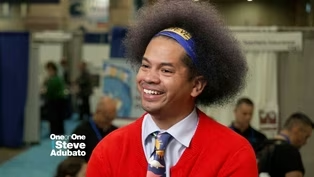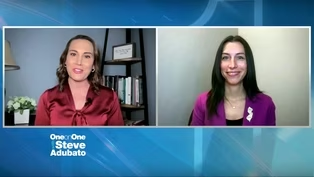One-on-One
Integrating wellness into school curriculums
Clip: Season 2025 Episode 2829 | 8m 8sVideo has Closed Captions
Integrating wellness into school curriculums
Senior Correspondent Jacqui Tricarico sits down with Dena Grushkin, Retired School Teacher and Access Educational Consultant for the New Jersey Education Association, to discuss the importance of integrating wellness into the curriculum to enhance the well-being of both students and teachers.
Problems playing video? | Closed Captioning Feedback
Problems playing video? | Closed Captioning Feedback
One-on-One is a local public television program presented by NJ PBS
One-on-One
Integrating wellness into school curriculums
Clip: Season 2025 Episode 2829 | 8m 8sVideo has Closed Captions
Senior Correspondent Jacqui Tricarico sits down with Dena Grushkin, Retired School Teacher and Access Educational Consultant for the New Jersey Education Association, to discuss the importance of integrating wellness into the curriculum to enhance the well-being of both students and teachers.
Problems playing video? | Closed Captioning Feedback
How to Watch One-on-One
One-on-One is available to stream on pbs.org and the free PBS App, available on iPhone, Apple TV, Android TV, Android smartphones, Amazon Fire TV, Amazon Fire Tablet, Roku, Samsung Smart TV, and Vizio.
Providing Support for PBS.org
Learn Moreabout PBS online sponsorship(upbeat music) - Joining me now is Dena Grushkin.
She's a retired school teacher and now is supporting educators through NJEA's ACCESS model, we'll get to in just a second.
Great to have you with us, Dena.
- Thank you.
Happy to be here.
- So, retired educator, 36 years in education.
Talk about that journey for yourself.
36 years, that's really something to celebrate.
- I have to say, and when I share my experience over with people, I always say that I was gifted a really fabulous career, you know?
I mean, it's amazing to wake up in the morning and go and do what you love, right?
We should all have that opportunity in our lives.
And so, you know, I mean, there were mornings, trust me, that I woke up and I'm like, "Ah, my God," you know?
But they really were few and far between, you know?
I really just really loved it.
I was laughing and doing what I love, which is learning and teaching and working with people who also, you know, like-minded.
We're all about kids.
And so it's been a fabulous career and one of the reasons why I'm still in this field in a different capacity.
- Right, I wanna talk about that 'cause 36 years dedicating yourself to students, to children here in New Jersey, and switching it just a little bit to then now support educators, folks just like yourself.
Talk about that, describe the ACCESS model and what it is and how you are supporting educators - in the state.
- Sure.
So I think it's important to share just a little bit about how I came to it.
As a school teacher, I was always very, very concerned.
It was of utmost priority for me to make sure that my kids were not just learning, but feeling safe and comfortable in the classroom.
And so when I came to, when this job opportunity came, it was an incredible opportunity for me to continue to do the work that I love so much, which is in the area of wellness.
And so I came on board and I've been now working as an ACCESS Consultant for the past year and a half.
This is my second year.
I was chosen to work in Trenton.
The ACCESS program works in three districts in the State of New Jersey, at Trenton, Camden, and we just started in Cherry Hill.
And so I'm working in Martin Luther King High School, working with teachers, working on a variety of different things, coaching, restorative practice work, working on curriculum, and teaching yoga.
So I'm having the opportunity to do, again, do what I love in the classroom.
- So yoga ties into mindfulness to self-awareness, to having a good mindset to be taking care of oneself so you can take care of others in so many ways, right?
- Absolutely, absolutely.
- How have you seen the educators respond to what you're teaching in terms of mindfulness and how do you see it as more important now than ever when we hear so much about teacher burnout?
- Well, you know what?
When I started in my career 36 years ago, no one was really concerned about how I was thinking and feeling.
And quite honestly, they really weren't thinking about how kids were feeling either.
And so we've evolved, you know.
I have to say, I think the problems have always been there in terms of kids experience, you know, growing up is hard, teaching is challenging, and so the levels of stress have always been there.
I think certainly over time that those kinds of things have changed, but they still exist.
And so, but the difference is now is that it's become really integral part of the program that we do.
So we work on not just how can we bring these practices to the kids, but how do we bring them to the teachers?
How do we train teachers?
How do we teach teachers, first of all, to be aware and in touch with what they need for themselves in order to be their best selves in the classroom?
And then in turn, taking those practices and turn-keying them into the classroom and teaching them to kids.
And so the response has been incredible, you know.
Rarely, I have to say, I don't even ever think I've ever heard a teacher say, "Oh, this is a waste of time."
You know...
They love it.
They love learning about what they can do for themselves and how they can bring this kind of work into their classroom, so they've been very, very responsive.
- Can you give us an example of that, how you've seen this really directly impact a teacher in such a positive way?
- At Martin Luther King, with the person that I'm coaching, 'cause that's my responsibility, to go in and coach teachers, we've been working on PLCs.
Professional Learning Communities.
And so they take place once a week and we have an opportunity to meet with teachers, the entire staff.
Not all are together, but they're broken down into groups.
And we meet with them and we work on these restorative practices.
And so we always start with breath work, sort of calming ourselves down, and then moving into this space.
We talk a lot about how we can make adjustments, sort of take a critical look at ourselves as teachers and how we can make adjustments to the way we bring ourselves into the classroom.
And that can be looking at the way, our teaching style.
It can be the way we organize ourselves.
It can be the way we choose to handle behavioral problems.
And so based on all of those, those are just an example of some of the things that we work on, based on those and working on ways in which to make adjustments to ourselves so that we can build better relationships with kids.
And so we work on that.
We work on breath work, we work on movement.
And generally speaking, by the time that PLC is done, that 45-minute period, teachers are feeling like they've been heard, they've been validated, they've shared, they got a little bit off their chest, and they're breathing better, they're moving better, and then they're headed back to the classroom.
- So we're seeing this in Trenton, we're seeing in Camden, now in Cherry Hill.
Do you anticipate it'll keep growing and be reaching other- - What I'm really, really proud of about this program is that the NJEA, we are the only union in the entire country that actually takes teachers and brings them back into the classroom.
And so it's teachers supporting teachers.
And so when I walk into a school, I'm not accountable to the administration, but I am accountable to the teachers that I work with.
So it's a really beautiful relationship because there is trust.
You know, no one feels judged.
They feel that they can come to me and they can share and we can talk.
And what happens between them and myself is strictly between them and myself.
And so I think that it is an incredible program, and I would, you know, I mean, I would love to see other unions throughout the country begin a program like this.
We're pretty special here.
- Well, Dena, thank you for the 36 years in the classroom with our students and now continuing that in the classroom with our educators.
Thanks so much for taking the time to speak with us.
We appreciate it.
- Thank you.
- [Narrator] One-On-One with Steve Adubato is a production of the Caucus Educational Corporation.
Funding has been provided by NJM Insurance Group.
The Russell Berrie Foundation.
Horizon Blue Cross Blue Shield of New Jersey.
Robert Wood Johnson Foundation.
Englewood Health.
Citizens Philanthropic Foundation.
NJ Best, New Jersey’s five-two-nine college savings plan.
New Jersey Sharing Network.
And by United Airlines.
Promotional support provided by The New Jersey Business & Industry Association.
And by NJ.Com.
- [Announcer] What is your child's dream for the future?
Doctor?
Teacher?
Architect?
Whatever they aspire to be, a college education may realize those dreams and NJ Best can help.
It's the college savings plan specifically designed for New Jersey families.
Start saving today with as little as $25, because now is the time to invest in their future.
To learn about NJ Best 529 college savings plan, its investment objectives, risks and cost, Read the investor handbook available at njbest.com.
NJEA Keynote Speaker talks book banning and mental health
Video has Closed Captions
Clip: S2025 Ep2829 | 9m 17s | NJEA Keynote Speaker talks book banning and mental health (9m 17s)
NJ State Teacher of the Year talks about student success
Video has Closed Captions
Clip: S2025 Ep2829 | 8m 43s | NJ State Teacher of the Year talks about student success (8m 43s)
Providing Support for PBS.org
Learn Moreabout PBS online sponsorship
- News and Public Affairs

Top journalists deliver compelling original analysis of the hour's headlines.

- News and Public Affairs

FRONTLINE is investigative journalism that questions, explains and changes our world.












Support for PBS provided by:
One-on-One is a local public television program presented by NJ PBS

